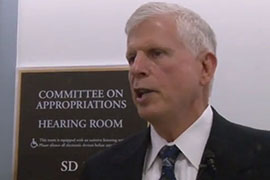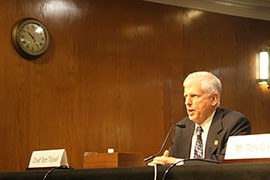Cronkite News has moved to a new home at cronkitenews.azpbs.org. Use this site to search archives from 2011 to May 2015. You can search the new site for current stories.
Forest Service chief seeks firefighting funds that will last all wildfire season
Editor’s Note: A previous version of this story incorrectly characterized Forest Service Chief Tom Tidwell's position on a Senate bill on wildfire funding. The service does not have a position on the bill, but Tidwell said he appreciates the effort by the senators and that the service wants to continue to work with Congress to find a solution to the funding problems. Clients who used this story are asked to run the correction that can be found here.
WASHINGTON – The head of the U.S. Forest Service told a Senate committee Wednesday that a fix is far overdue for the practice of “fire borrowing” that his agency has been forced to resort to for sufficient wildfire fighting funds.
Forest Service Chief Tom Tidwell said fire borrowing has happened in eight of the last 10 years. It occurs when the service exhausts its firefighting budget before the year is over, forcing it to transfer funds from other programs to cover wildfire costs for the rest of the year.
“It is past time for us to find a fix and to stop the transfer, to stop having to shut down our operations in August, to be able to move on with all the programs across the country, to be able to pay the cost of fire suppression,” Tidwell told a Senate Appropriations subcommittee. “This is our best opportunity for once and all to stop this problem.”
His comments came during a hearing on the agency’s proposed $4.9 billion budget for fiscal 2016, which Tidwell said represents a $130 million reduction from the current year’s budget.
Included in that budget request is a proposed $854,578 fire suppression “cap” – a fund that the agency could tap for unusually large fires or to pay for operations when the regular budget runs dry, taking the place of fire borrowing. That fund was requested, but not included, in the current year’s budget.
Tidwell said fire borrowing is not just a bookkeeping maneuver – it hurts other Forest Service functions.
“It’s not fire borrowing, it’s fire transfer because there’s no guarantee that it comes back,” Tidwell said after the hearing, pointing out that the Forest Service relies on Congress to replenish the borrowed funds. While the return almost always comes, it can take up to a year, and the programs that were tapped suffer in the meantime.
Sens. Tom Udall, D-N.M., and Jon Tester, D-Mont., shared Tidwell’s concerns and agreed on the need for a cap.
“The disaster cap is the key to breaking the cycle of fire borrowing and putting an end once and for all for the need to steal funds from land management programs to pay for emergency firefighting needs,” Udall said. “Many of the programs that we borrow funding from to fight fires are the same programs that create a more resilient landscape to resist wildfires.”
Some senators grilled Tidwell on Forest Service responsibilities in their states that they felt have been slighted, such as timber production, recreation management and facility maintenance. More than once, Tidwell replied that fire-fighting costs took away funds dedicated to those services and played a factor in the agency’s lackluster performance in those areas.
But some, like Sen. Lisa Murkowski, R-Alaska, were skeptical. She told Tidwell she found it hard to believe that fire borrowing was entirely responsible for the declining timber industry in her state.
In a state-by-state report last year on the impacts of fire borrowing, the Forest Service said that in 2012, Arizona saw maintenance left undone, projects and contracts canceled – one of which was a fuel-treatment fire prevention project. The state also saw funding issues in 2013, although less severe, according to the report.
Arizona Republican Sens. John McCain and Jeff Flake, along with Sen. John Barrasso, R-Wyo., have introduced a bill that would address the ongoing wildfire funding issues. The Forest Service does not have a position that bill, but Tidwell said after Wednesday’s hearing that he “appreciates the senators’ interest in finding a solution.”
“We do feel that this is a better solution,” Tidwell said of the agency’s request for a fully funded budget. “But we definitely want to continue to work with the senators on this.”
In the meantime, Tidwell said that approving the fire suppression cap in the agency’s proposed 2016 budget would eliminate the need for fire borrowing altogether next year, without adding to the bottom line that exists with the current transfer process.
“It doesn’t cost any more,” he said. “It just allows us to be more efficient, more effective and it’s just a much better business approach to being able to deal with this issue.”









